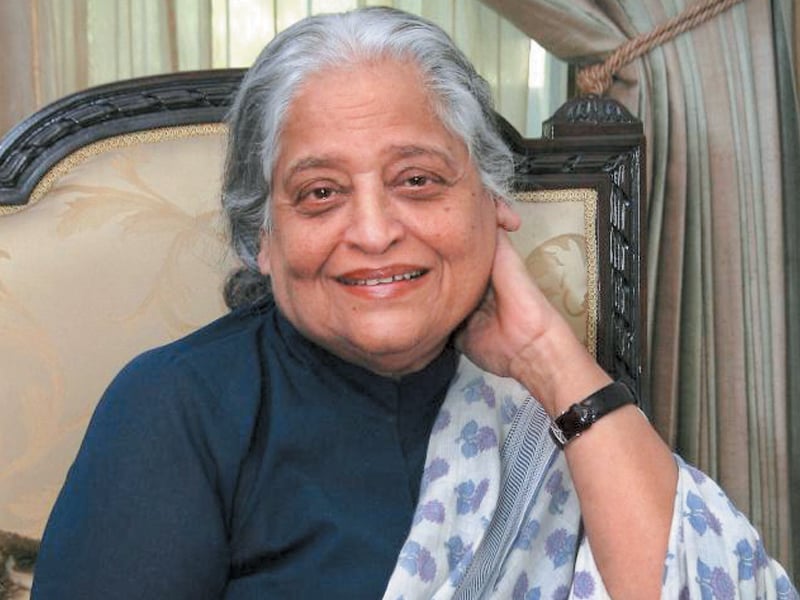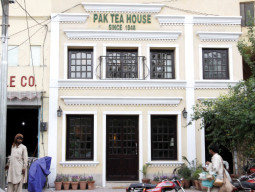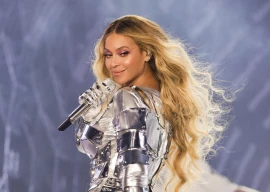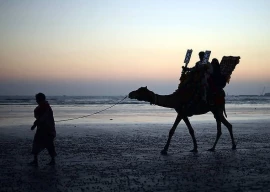
On Tuesday, she got an ovation for her rousing speech on “Why must I follow on the same road? Let’s travel together, arm in arm” hosted by the Aga Khan University as part of its special lecture series. These lectures are part of the university’s multidisciplinary approach to education, aiming to enrich students and the general public with an understanding of the humanities and social sciences.
Nigah was one of the two female poets - the other being Ada Jafri - to pave way and gain prominence in the male-dominated world of Urdu poetry in the post-Partition years. Eventually, the time also arrived when Jafri and Nigah used to recite in mushairas alongside Faiz Ahmed Faiz, Ahmed Faraz and Habib Jalib.
“Nature does not discriminate between a male and a female when it awards competence and abilities,” said Nigah. “It is the society that discriminates between the two and accentuates potential of one at the expense of undermining the others’.”
Nigah started composing poetry at the age of eight or nine. Later, she got inspiration from Ada Jafri. At that time, she said, women poets were very few and most of them were, in some way, linked to the infamous ‘chowks’ or ‘baazar-e-husn’.
While poetry was considered a God-gifted ability, the sub-continent’s ‘shurfa’ did not allow their women to compose verses and stanzas, she added. “Being a shayra (poetess) was not only considered a taboo but women were also thought incapable of writing serious poetry,” she said. “For me, however, poetry was a medium to communicate love that should not be compartmentalised into gender roles and differences.”
Opposition and support
Nigah shared the social pressures she and her family faced when she attended the first mushaira organised by the All Pakistan Women’s Association. “There were fears, such as people asking for explanation of the words, feelings and expressions in my composed stanzas, and that their assumptions would create hurdles in my marriage.”

Nevertheless, she participated with support from her mother and sisters and the event opened new avenues for her as she started receiving invitations to read in mushairas, one followed by the other. “My participation helped develop a confidence in me, that I was recognised as a poet and people wanted to hear me read my poetry,” she said. “I moved past all the fears of being black-washed.”
Leading the way
Nigah ultimately emerged as a poetess who was known for her rendition of verses about the compulsions and compromises of being a woman and who was followed by the likes of Shabnam Shakil, Parveen Shakir, Kishwar Naheed, Fatima Hasan and others.
“Even to this day, I truly admire the young poetess who diligently dress themselves for a mushaira and confidently present their poetry before the audience,” said Nigah
Nigah also recited some of her poems, including the famous “Mein bach gai, Maa” [I was saved, mother] that reflects the poet’s sentiments for an unborn baby-girl and compels one to detest the inhuman customs that lead to female feticide.
Earlier, Aga Khan University Dean Dr Farhat Abbas introduced the speaker as one of the most inspirational poets of today. “Zehra Nigah is not only a name but has become a part of our literary history. She is among those few who are referred to as a living classic.”
Humble beginnings
Born in Hyderabad, India, Zehra Nigah migrated to Pakistan in 1947. She came from a family interested in the creative arts. Her father, a civil servant, enjoyed poetry, her mother music and her maternal grandfather the classical poets. Her elder sister, Fatima Suraiyya Bajiya, is hailed as an exceptionally talented writer in Pakistan’s television world. One of her brothers, Anwar Maqsood, is a noted satirist and public speaker.
Zehra Nigah has to her credit three books of poetry - Shaam Ka Pehla Taara (with an introduction by Faiz Ahmad Faiz), Warq, and Firaq.
Published in The Express Tribune, April 26th, 2013.
COMMENTS (1)
Comments are moderated and generally will be posted if they are on-topic and not abusive.
For more information, please see our Comments FAQ































A true living legend amongst us!